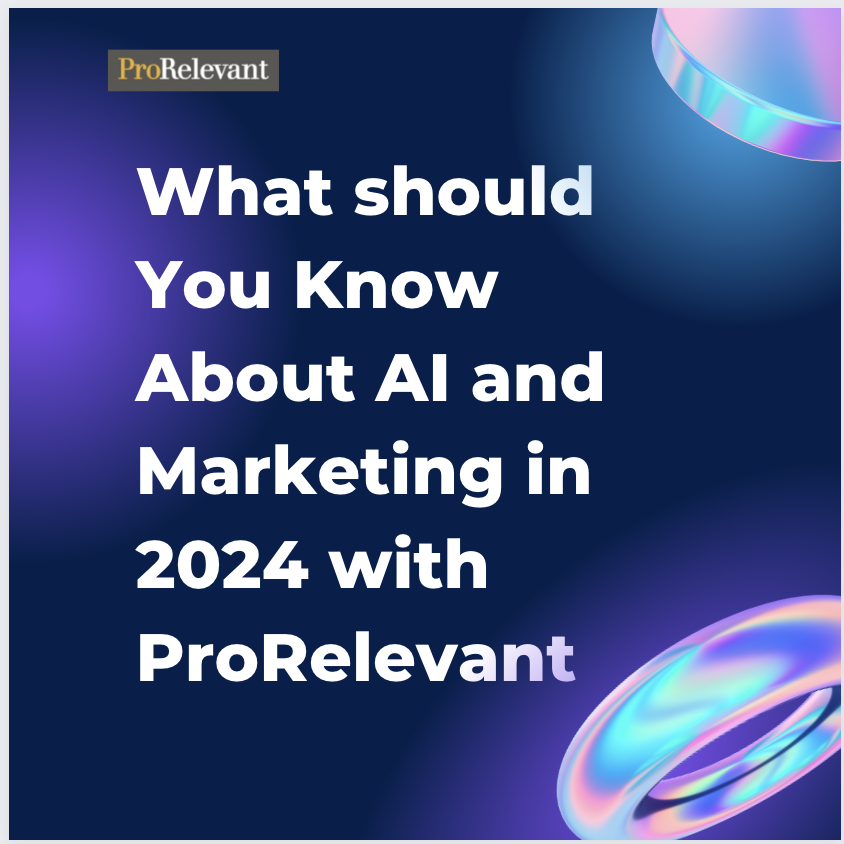
26 Jan What should you know about AI and Marketing in 2024 with ProRelevant
Artificial Intelligence (AI) has emerged as a transformative force in the field of marketing, redefining how businesses engage with their consumers. At its core, AI involves emulating human intelligence in machines programmed to replicate cognitive functions like learning and problem-solving. As technology advances, the influence of AI on marketing becomes increasingly profound, reshaping strategies and paving the way for innovative approaches.
What is AI in Marketing?
In marketing, AI leverages algorithms and data analytics to scrutinize consumer behavior, preferences, and patterns. This empowers businesses to glean valuable insights, enhance customer experiences, and streamline marketing efforts. AI-driven tools can automate repetitive tasks, allowing marketers to focus on more strategic aspects of their campaigns.
What is the Impact of AI on Marketing?
The integration of AI into marketing strategies has ushered in a paradigm shift, influencing various facets of the industry. One of the most significant impacts is the personalization of marketing campaigns. AI algorithms can analyze extensive data sets to craft personalized content tailored to individual preferences, fostering more meaningful consumer interactions.
Moreover, AI enhances targeting precision by identifying specific audience segments likely to engage with a particular product or service. This maximizes the efficiency of advertising budgets and improves the overall return on investment for marketing campaigns.
What are the Predicted AI in Marketing Trends for 2024?
1. Precision in Personalization: How can you tailor content using AI?
In 2024, the trend of hyper-personalization in marketing is expected to reach unprecedented levels. AI algorithms will evolve to understand individual consumer behaviors better, allowing marketers to craft highly personalized content and recommendations.
For instance, e-commerce platforms may utilize AI to analyze past purchase history, enabling them to recommend products tailored to each user’s preferences and browsing patterns.
Hyper-personalization in marketing increases customer engagement with the platform, according to Forbes. In a research study by Twilio, they found that 62% of consumers expect personalization and were more likely to lose brand loyalty without it. Additionally, 49% of consumers expressed they are more likely to become repeat users/buyers if personalization is offered in their experience.
2. Vocalizing Success: How can you optimize voice search through AI?
The increasing prevalence of voice-activated devices will drive a key trend in 2024 – optimizing marketing strategies for voice search. AI-driven voice recognition technology will play a pivotal role in ensuring that marketing content aligns with the natural language used in voice searches.
For example, businesses may leverage AI to understand conversational queries, optimizing their content to align seamlessly with voice-activated search platforms like virtual assistants and smart speakers.
A research study by WebFX found that 71% of consumers find shopping easier when using voice search.
3. Intelligent Conversations: What is the impact of the evolution of AI-powered chatbots?
In 2024, AI-powered chatbots are set to become more sophisticated and integral to customer service. These virtual assistants, driven by natural language processing and machine learning, will respond instantly and accurately to customer queries.
Examples include businesses deploying AI chatbots on their websites, allowing customers real-time assistance navigating products and services, or resolving issues without human intervention.
4. Data-Driven Retention: How can you harness predictive analytics with AI?
Fueled by AI, predictive analytics will play a pivotal role in customer retention strategies. AI algorithms analyzing historical data and customer behavior patterns will predict customers at risk of churning.
For instance, subscription-based services use AI to identify subscribers likely to cancel, enabling them to implement targeted retention campaigns such as personalized offers or exclusive content to keep customers engaged and loyal.
5. Augmented Experiences: How has AI-enhanced the AR revolution?
In 2024, the combination of Augmented Reality (AR) and AI is set to redefine consumer interactions with products and brands. More immersive and personalized AR experiences in marketing campaigns will emerge. AI algorithms will enhance AR applications by tailoring virtual experiences based on individual preferences and behaviors.
For example, furniture retailers may use AI-driven AR to allow customers to virtually place and visualize furniture in their homes before making a purchase decision.
Conclusion
In conclusion, integrating AI in marketing is an ongoing revolution shaping the industry. The anticipated trends for 2024 showcase a trajectory toward more specific, efficient, and innovative marketing strategies. As businesses embrace these trends, they will be better positioned to navigate the dynamic marketing landscape and stay ahead of the competition in the digital era.
Want to know more?
Visit prorelevant.com to find out how you can customize your marketing efforts.
Check out my previous articles about Demystifing Analytic AI and The Intersection between Generative and Analytic AI.
References
Natanson, Elad. “Hyper-Personalization Is Already Here – Its Future Is Even More Cutting-Edge.” Forbes, Forbes Magazine, 7 June 2023, www.forbes.com/sites/eladnatanson/2023/06/01/hyper-personalization-is-already-here—its-future-is-even-more-cutting-edge/?sh=7f72cb895cc2.
Phillips, Megan. “15 Voice Search Trends & Statistics for 2024.” WebFX, 25 Sept. 2023, www.webfx.com/blog/seo/voice-search-trends/.




No Comments